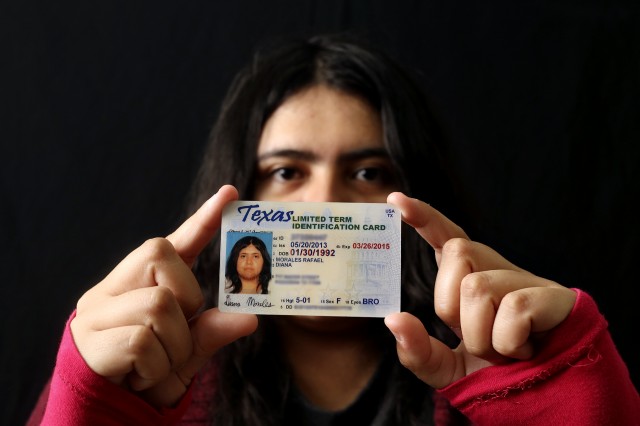Students Benefit from Deferred Action, But Hurdles Remain

UT sophomore Diana Morales holds the state identification card she received through the federal deferred action program. She is one of 72,400 undocumented immigrants in Texas who have won temporary legal status through the program. Photo by Pu Ying Huang.
By Jody Serrano
For Reporting Texas
After years of living as an undocumented immigrant from Mexico, Heriberto Perez received a letter last year that changed his life. Perez had been granted temporary legal status under a federal program for certain young immigrants brought here illegally by their parents. For now, he can live without fear of being deported.
For two years, Perez, a 20-year-old sophomore at the University of Texas at Austin, will be allowed to get a driver’s license and a job in the U.S. and do other things he could not do not as an undocumented immigrant.
“A lot of problems that I had growing up have some semblance of a solution now,” Perez said. He’d always felt guilty about being unable to work during high school. Now he has a job as a student assistant at the university. “I can actually help my parents out and send them money.”
Perez is one of 72,400 undocumented immigrants in Texas who have won temporary legal status under Deferred Action for Childhood Arrivals. The 2012 executive order by President Barack Obama grants a temporary reprieve from the risk of deportation to undocumented immigrants who meet certain requirements. The deferral allows them to get a temporary driver’s license or state identification, a Social Security number and a work permit. They can travel back to their home country only under special circumstances.
Dallas-based immigration attorney Isaul Verdin said many of those who were approved are students. Although those granted deferred status express joy at their newfound safety and opportunity – however temporary – they say there is still much work to be done.
In Texas, 93,277 people applied for deferred action, the second most of any state. California received 161,624 applications, according to the U.S. Department of Homeland Security.
In order to qualify for deferred action, individuals must meet several requirements, including:
- They must have been younger than 31 on June 15, 2012.
- They must have come to the U.S. before they were 16 years old.
- They must be in school or have a high school diploma or equivalent, or be veterans of the U.S. military.
- They must not have been convicted of any felony, significant misdemeanor or more than three misdemeanors.
Perez was three when his parents brought him and two siblings from Mexico to the border town of Pharr in South Texas’ Rio Grande Valley for better opportunities.
He said the biggest benefits of deferred action for him have been the ability to get a job and to travel without fear between Austin and Pharr, a route that includes a checkpoint manned by the U.S. Border Patrol. He’s planning to apply soon for a Texas driver’s license.
For some applicants, the news is not all good. Perez’s classmate Diana Morales said that when she got her deferred action notice, she thought of her mother, who lives in Houston.
“I was actually sad because my mom didn’t have anything,” said Morales, a UT sophomore, adding that she fears her mom could be deported because she is in the country illegally. “I still live in constant fear that she’s going to be gone one day, and I don’t know when that day will be or whether I’ll even know what happened to her.”
Morales, 21, and her family came to Houston when she was seven years old. Morales said she has obtained a state identification card under deferred action, and that it has provided many benefits.
Teri Albrecht, director of international student and scholar services at UT, said deferred action makes it easier for undocumented students in college to succeed. They now can work to pay for their education, she said.
However, Albrecht says they still face barriers. For instance, Albrecht said undocumented students are not eligible for work-study programs, which allow students to work on campus. Undocumented students also may not be able to study abroad.
“The general consensus we’ve heard from our students is that while [deferred action] was a positive step in the right direction, students never saw it as a permanent solution,” she said.
Verdin, the immigration attorney, said he has seen deferred action transform the lives of many students. But he said the program is not as effective as it could be because many undocumented people are scared to apply.
“A lot of people that do qualify don’t apply because they’re scared the government will have all their information,” Verdin said.
Jose Manuel Santoyo, 21, of Corsicana got his deferred action notice in August.
Santoyo, who graduated in 2012 from Navarro College, founded the Corsicana Immigrant Rights Group, which helps undocumented students seeking deferred action. He said now that deferred action has opened doors, he wants to inspire undocumented immigrants to get out of the shadows.
“We were limited to whatever was offered to us, and now we have equal opportunity that everyone else has,” Santoyo said.